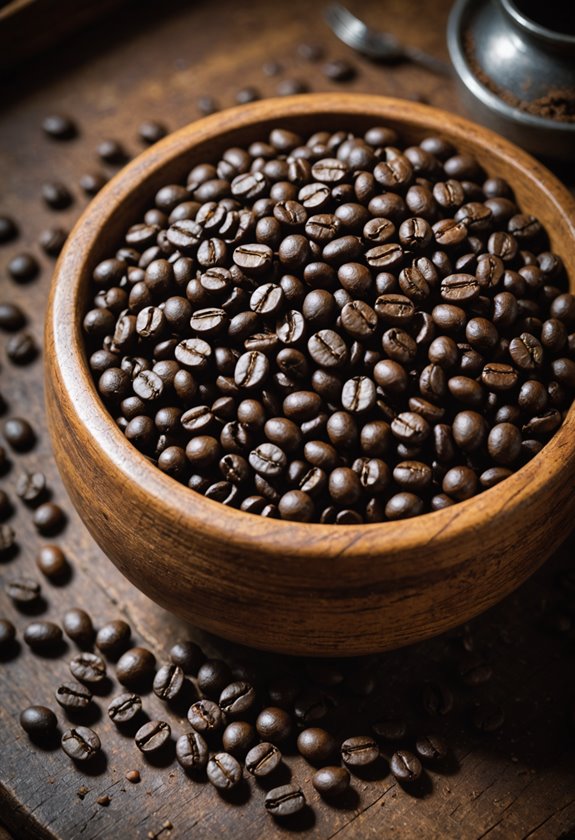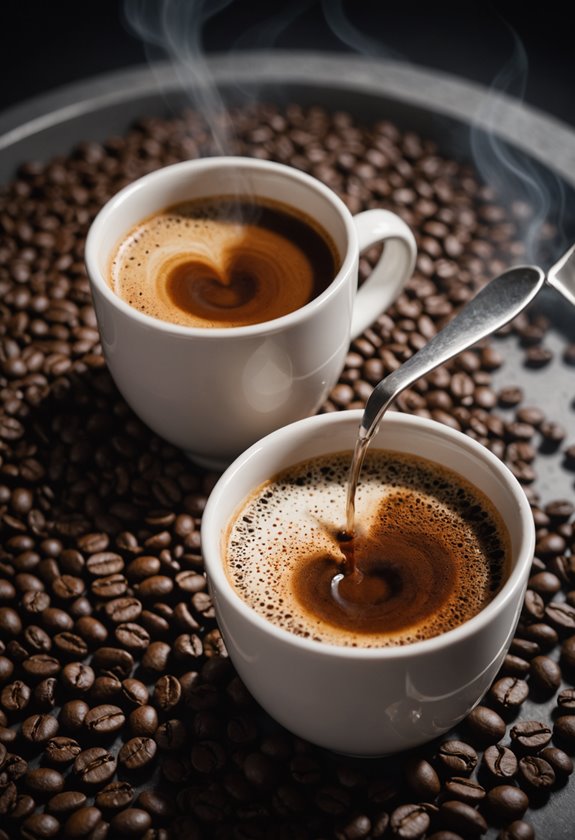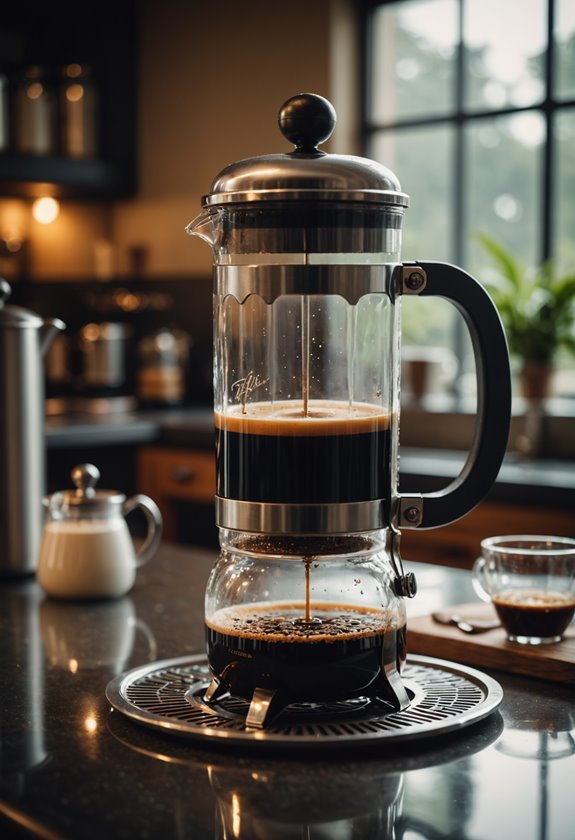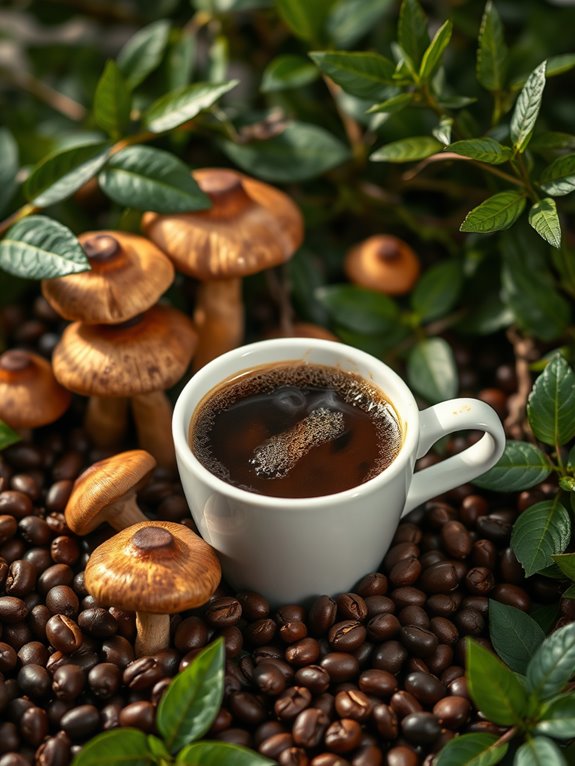Which Is Better, Ground Coffee or Beans?
If you're deciding between ground coffee and whole beans, consider that whole beans often deliver superior freshness and flavor. Let's investigate why: whole beans retain their taste longer, staying fresh 15-21 days post-roast, while ground coffee starts losing flavor within 10 days due to oxidation. Grinding whole beans right before brewing captures peak flavor and aroma, essential for a great tasting cup. Although whole beans require more effort, as you need a grinder, they provide flexibility with grind size, impacting how your coffee tastes. Ground coffee offers convenience but can become stale quickly. Look further, and uncover more brewing observations.
Key Takeaways
- Whole beans retain flavor longer, enhancing taste and aroma, while ground coffee loses flavor quickly due to oxidation.
- Grinding beans just before brewing captures stronger flavor profiles, improving overall coffee quality and experience.
- Whole beans allow customization of grind size for different brewing methods, ensuring optimal extraction and flavor.
- Investing in whole beans and a grinder offers long-term savings and better flavor retention compared to pre-ground coffee.
- Ground coffee is more convenient but lacks the freshness and flavor longevity of whole beans, making it less economical over time.
Freshness and Flavor

When it comes to coffee, freshness and flavor make all the difference. You might wonder why whole bean coffee seems to taste better than pre-ground options. The answer lies in how long coffee maintains its peak freshness.
Whole bean coffee retains its lively flavors and aromas for 15-21 days post-roast, whereas pre-ground coffee starts losing flavor within just 10 days due to quicker oxidation. By choosing whole beans, you preserve the essential lipids and oils that contribute to rich aroma and taste.
Now, let's examine the benefits of freshly ground coffee. Grinding your own coffee just before brewing guarantees you're capturing the most strong flavor profiles.
As soon as you grind your beans, they begin to lose their taste due to increased air exposure. Significant flavor degradation can occur as quickly as 20-30 minutes post-grind. Freshly ground coffee releases more gases and aromas during brewing, offering a richer and more complex taste experience compared to pre-ground coffee. For optimal freshness, it's recommended to store coffee beans in an airtight container to minimize their exposure to air.
If you grind your beans at home, you'll notice the coffee tastes noticeably fresher and more flavorful, providing a thoroughly satisfying cup every time.
Grinding Techniques
Although grinding coffee just before brewing is vital to maximizing freshness and flavor, the method you use greatly impacts the final result.
Let's investigate some effective grinding techniques to enhance your coffee experience.
1. Consistency is Vital: Using a burr coffee grinder guarantees a consistent grind size, which is necessary for ideal extraction and flavor.
Unlike blade grinders, burr grinders crush whole beans evenly, leading to a better coffee taste.
2. Match Grind Size to Brewing Method****: Different brewing methods require specific grind sizes.
For example, a coarse grind is perfect for a French press, while a fine grind suits espresso.
Matching grind size to the method maintains balance and accentuates flavors.
3. Manual vs. Electric Grinders: Both manual and electric grinders can efficiently grind coffee, but electric burr grinders provide more control over grind size and consistency.
They're ideal if you're aiming for precision and ease of use, especially with models like the Fellow Opus Conical Burr Coffee Grinder.
4. Timing and Freshness: Grinding whole beans just before brewing guarantees maximum freshness.
Ground coffee loses its flavor quickly, so timing is essential to preserve taste and aroma.
Caffeine Content

Caffeine content in coffee is largely dictated by the type of bean you choose, with Robusta beans packing about twice the caffeine strength of Arabica beans. That means if you're seeking a strong caffeine jolt, Robusta might be your go-to.
However, many coffee lovers prefer the milder taste and lower caffeine of Arabica for their daily coffee.
Whole vs. Ground Beans
When considering whole versus ground beans, caffeine levels remain consistent. Whether you choose whole beans or ground coffee, the caffeine content doesn't change based on the grinding method.
Yet, freshly ground coffee tends to maintain its caffeine potency better over time compared to pre-ground coffee. This happens because pre-ground coffee can lose some caffeine due to air exposure.
Grinding and Brewing
The grind size and brewing method do, however, play a role in how much caffeine ends up in your cup. Finer grinds allow for quicker caffeine extraction, which might appeal to those needing an immediate caffeine enhancement. Additionally, the type of bean selected can significantly influence the overall caffeine levels in your brewed coffee.
Storage and Shelf Life
Proper storage practices are vital for maintaining the freshness and flavor of your coffee, especially if you want to savor every cup. Let's investigate how to effectively store whole bean coffee and pre-ground coffee to maximize shelf life.
Whole Bean Coffee
1. Storage Duration: Whole bean coffee maintains peak freshness for 15-21 days after roasting.
It's essential to store them in an airtight container to protect against oxidation, which leads to flavor loss.
2. Freezing: Freezing whole bean coffee can extend its shelf life considerably.
Make sure it's sealed well to prevent moisture from ruining your beans. Additionally, keeping beans in a cool, dark place helps preserve their quality for longer periods.
Pre-Ground Coffee
3. Quick Degradation: Pre-ground coffee begins losing freshness and flavor within 20-30 minutes of grinding.
Its increased surface area makes it more vulnerable to oxidation, causing rapid flavor loss.
4. Storage Tips: Store pre-ground coffee in an airtight container to slow down oxidation.
However, its shelf life typically doesn't exceed 10 days before noticeable flavor degradation occurs. It's crucial to consume it quickly to enjoy the best taste and aroma.
Brewing Techniques

When it comes to brewing coffee, the choice of technique can dramatically influence the flavor and aroma of your cup. Different brewing methods, like French press, espresso, and pour-over, require specific grind sizes to achieve the best flavor extraction. For example, a coarse grind suits the French press, while a fine grind is necessary for espresso. Understanding these differences helps you make informed decisions about your coffee brewing techniques.
Whole Beans and Grind Customization****
Using whole beans allows you to customize your grind size based on your preferred brewing methods. Coffee grinders, particularly burr grinders, provide a consistent grind, ensuring balanced flavor extraction. This is crucial because the grind size directly correlates with the brewing method you choose.
This customization is key to achieving ideal taste and aroma, as freshly ground coffee enhances the bloom during brewing, leading to a richer flavor profile compared to pre-ground coffee.
Impact of Grind Size on Flavor
The grind size not only affects brewing speed but also impacts extraction levels. Finer grinds result in faster extraction, which can lead to bitterness if over-extracted, while coarser grinds slow the process, offering a smoother taste.
Pros and Cons
While opting for whole beans or pre-ground coffee depends on your priorities, both have distinct pros and cons that can affect your coffee experience.
Let's examine these differences to help you decide what's best for you.
Whole Bean vs Ground
1. Freshness and Flavor: Whole beans offer a superior taste because they retain Freshness and Flavor for 15-21 days post-roast.
In contrast, pre-ground coffee tends to lose its flavor within 10 days due to oxidation. If you value a rich taste, whole beans are your go-to, especially in your morning ritual.
2. Grinding Flexibility: With whole beans, you can use a grinder to achieve a different grind size suitable for various brewing methods.
This versatility is absent in pre-ground coffee, which is limited to a single grind size.
3. Convenience vs. Quality: Pre-ground coffee provides convenience and quicker preparation but often at the expense of flavor.
Whole beans require an air-tight container to maintain their quality, offering a better experience for specialty coffee lovers.
4. Economic Value: Although whole beans need an initial investment in a grinder, they provide better Economic Value over time.
Their longer shelf life and superior flavor retention make them a worthy choice.
Frequently Asked Questions
Is It Better to Buy Ground Coffee or Whole Bean Coffee?
You should buy whole bean coffee. It stays fresh longer, lets you customize grind size, and offers superior flavor and aroma. Grinding your own beans gives you control over taste, making your coffee experience more personal and enjoyable.
Are Coffee Beans Healthier Than Coffee?
You'll find coffee beans are healthier since they retain more antioxidants and beneficial compounds. By grinding them fresh, you preserve essential oils and nutrients, enhancing health benefits. Pre-ground coffee loses these advantages due to oxidation.
Why Is Ground Coffee Better?
You'll find ground coffee convenient because it saves time and effort. It's consistent, beginner-friendly, and offers immediate access to various blends. Without needing grinders, it suits traditional drip makers and is often more budget-friendly.
What Is the Healthiest Form of Coffee?
You'll find the healthiest coffee comes from whole beans. They retain more antioxidants and beneficial compounds. By grinding them fresh, you maximize flavor and health benefits. This method guarantees a more lively taste and less contaminant exposure.
Conclusion
When deciding between ground coffee and whole beans, consider your priorities. Whole beans offer superior freshness and flavor, but require a grinder and more prep time. Ground coffee is convenient and quick, but might lack that fresh aroma. Think about storage, caffeine content, and your preferred brewing technique. Each choice has its own pros and cons, so weigh them carefully. Ultimately, your perfect cup depends on how much time and effort you're willing to invest.







